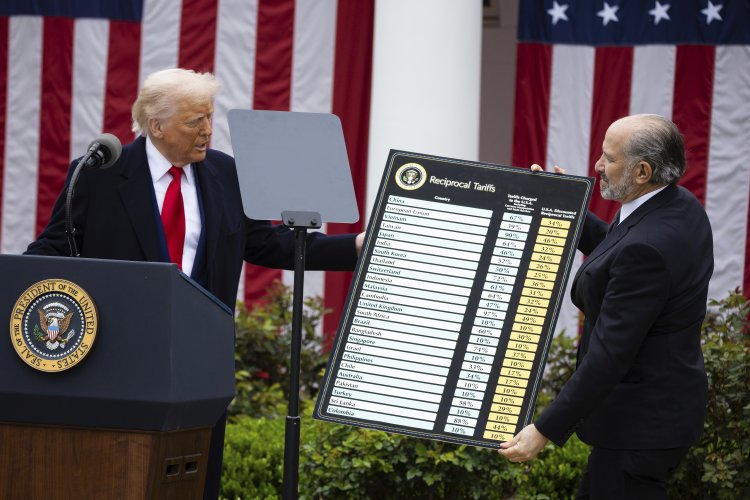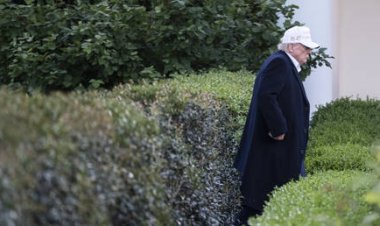Financial worries shift political currents away from Trump
After advocating for lower prices, Donald Trump dedicated his initial 100 days to implementing tariffs that pose a risk of increasing the cost of living.

Ninety-nine days later, voters continue to wait and are beginning to express their frustration.
Trump’s tumultuous initial months have plunged the U.S. into chaos, undermining the foundations of its financial system and fuelling fears that the president who promised to guide the nation into a prosperous "golden age" is, in reality, steering it toward an economic crisis.
Public confidence in Trump’s management of the economy is waning, with many now stating that his modifications to the nation's political and economic systems have gone "too far." The trade war initiated by the president is testing the resilience of global markets and businesses. Among his allies, there is increasing concern that Trump is wasting his political mandate by enacting policies likely to lead to even higher prices.
“He’s all in on the tariffs, and that’s a really big bet for him,” noted Douglas Holtz-Eakin, president of the conservative think tank American Action Forum and a former economic adviser to George H. W. Bush. “I’m going to be honest: I don’t think it’s a good bet.”
The economic upheaval caused by Trump’s broad tariff strategy has erased billions from retirement accounts over the past month and significantly dampened consumer sentiment, signaling the end of the White House’s brief honeymoon period.
Recent polling ahead of his 100-day milestone shows Trump struggling with voters regarding his economic management, including one Pew Research Center survey indicating that trust in his economic decision-making is at an all-time low. Consumer confidence has declined sharply since January, as voters brace for rising inflation and a scarcity of job opportunities.
This financial turmoil appears to be shifting the political climate against Trump and the GOP. In a recent Economist/YouGov poll, half of the respondents claimed the economy worsened since Trump took office. Over 40% graded the first 100 days of his presidency with an “F.”
“Is it concerning? Sure it is,” acknowledged Stephen Moore, an external economic advisor to Trump. “As a Republican that wants Trump to succeed, you need the political capital to move ahead with your agenda.”
In response to these concerns, White House spokesman Kush Desai characterized Trump’s first 100 days as an economic success, highlighting commitments from major corporations to invest in U.S. manufacturing and a slight decrease in the March inflation rate—driven by declining fuel prices—marking the first monthly drop in years.
"President Trump's America First policies are delivering much-needed economic relief for everyday Americans while laying the groundwork for a long-term restoration of American greatness," Desai stated, asserting that Trump "delivered a historic economy in his first term, and he's running back the success in his second term."
However, this optimistic perspective is clashing with an electorate primarily focused on the repercussions of Trump’s tariffs. Their diminishing support for the president's economic plans reflects a dramatic change from just a few months ago when concerns about rising living costs and a desire for the pre-pandemic economy contributed to Trump’s unexpected political resurgence.
During his campaign, Trump worked to bolster his economic advantage by pledging to quickly reduce energy costs, make housing more affordable, and lower grocery prices. After defeating former Vice President Kamala Harris largely due to Americans’ frustrations with rising prices, Trump stated at his inauguration his intention to “direct all members of my Cabinet to marshal the vast powers at their disposal to defeat what was record inflation and rapidly bring down costs and prices.”
Despite this mandate, Trump has spent his early months preoccupied with a trade war, focusing less on addressing immediate voter concerns than on dramatically restructuring the global economic landscape.
“The No. 1 issue for a lot of voters was inflation and cost of living, and tariffs increase the cost of living,” opined Avik Roy, chairman of the think tank Foundation for Research on Equal Opportunity and a veteran GOP policy analyst. “Whatever he’s doing that might be constructive, for example, in terms of regulatory reform that could unlock economic activity, it’s all being overwhelmed.”
White House aides have openly recognized that their tariff strategy forces Americans to endure the “pain” of disrupting trade alliances and reshaping supply chains, with economists predicting such actions will elevate prices and heighten the risk of shortages for items ranging from vehicles to electronics to clothing.
Yet they maintain that this hardship will be temporary and that the nation will eventually emerge stronger as companies relocate manufacturing to the U.S. and foreign nations rush to renegotiate terms. The administration is also concurrently working to cut regulations, curb federal spending, enhance oil drilling, and tighten immigration—all measures officials argue are keeping inflation in check as Trump strives to finalize a series of trade deals.
"From our point of view, a lot of great foundational progress has been laid," remarked one White House official, who wished to remain anonymous due to restrictions on public comments, about the administration's less-publicized efforts to lower prices. "This isn’t a thing that’s going to be resolved within 100 days."
Inside the West Wing, officials have found reassurance in stable economic data, even while consumer confidence plummets. This includes strong labor market metrics, consistent inflation readings, and retail sales figures that suggest consumers are not yet curbing their major purchases.
Despite their monitoring of recent polling, Trump’s aides and advisers tend to dismiss the decline in his approval ratings as premature and exaggerated, holding onto their belief that he will ultimately be vindicated, just as they argue he has been in the past.
“President Trump’s base is solid,” affirmed John McLaughlin, a Trump pollster. “There may be some changes at the margins on some swing voters, but they’ll come back because there’s time to get the tax cuts passed.”
However, this sense of calm is not shared across the broader Republican landscape, which includes members of Congress who, unlike Trump, must answer to voters in next year's midterms, a situation that could shift the power dynamics in Washington.
On Capitol Hill, GOP lawmakers have increasingly expressed unease about the White House’s tariff strategy, though they remain hesitant to formally rein Trump in on the matter. As Holtz-Eakin said, those in Republican economic circles are now “staring pretty hard at the data” for any fresh signs that the job market might be faltering.
“There are some bad data points out there to be worried about,” Holtz-Eakin admitted. “But nothing focuses the mind like a one percentage point increase in the unemployment rate.”
This uncertainty has raised the stakes surrounding congressional Republicans’ tax bill, seen by Trump allies as potentially the only significant opportunity to shift focus away from the tariffs and mitigate their negative impact on voters' perceptions.
The legislation extending the tax cuts Trump enacted in 2017 is crucial to preventing a steep tax increase on top of the additional costs from his tariffs. Trump has also proposed a variety of new tax exemptions aimed at benefiting segments of the working class. Nonetheless, Republican lawmakers continue to struggle with assembling this package, including identifying hundreds of billions in spending offsets that may be unpopular on their own.
“Failure is not an option here,” Moore stressed, expressing hope that passing the bill could significantly improve Trump’s economic standing with voters. “If they can’t get this done, then all the taxes go up… and then there’s no way Republicans can keep control of the House and Senate.”
Despite the growing concerns, Trump has shown no intention of backing down from his trade war, convinced that his strategy will eventually prove beneficial. However, with no clear resolution in sight, pollsters caution that the economic struggles reminiscent of the Biden era that facilitated Trump’s rise should also serve as a warning about how swiftly voter dissatisfaction could turn against him.
“The first 100 days are typically when the president gets an immense amount of grace from the voters,” stated Lakshya Jain, co-founder of Split Ticket, an election data analysis firm. “If they already don’t like it, well, historically these things don’t get any better over time.”
Anna Muller for TROIB News
Find more stories on Business, Economy and Finance in TROIB business












